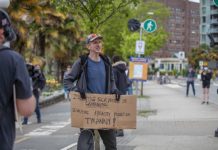In this article Gary Hussey turns his eye to the recent Irish Presidential Elections which not only saw the return to the Aras the incumbent socialist candidate Michael D. Higgins, but also the emergence of something more sinister indeed. For Hussey, the true ‘event’ of the elections was the normalisation of racist and fascist/right-populist discourse in the figure of the runner-up Peter Casey, a “Dragon” from RTÉ’s take on the “Dragons Den” format. The take home message from Hussey’s analysis is that ‘a racist is not necessarily always someone who racks up unusually steep dry cleaning bills owing to a large collection of white sheets. It is the everyday practices of quietly delegitimising the position of a minority’ through which racism is reproduced.
On the evening of 27th of October 2018, the incumbent President of Ireland, Michael D. Higgins, took to a podium in Dublin Castle to deliver his acceptance speech upon being elected to his second term in office. This moment, of course, was never really in doubt. At no point during the election campaign was Higgins’ smooth transition into his seven-year second lap in jeopardy. As a hugely popular public figure, with the polls having consistently placed the incumbent so far ahead, most of the challengers appeared to be engaging in little more than the building political funeral pyres out of cash. One needed to periodically avert the eyes in order not to become bothered with some niggling of undue pity. Meanwhile, all the establishment parties, Fine Gael, Fianna Fáil, and Labour (Higgins’ former party), as well as a spattering of non-entities, opted to forego the opportunity to forward their own candidates, and decided to row fully behind Higgins. This was not solely a cynical exercise in the preservation of the war coffers for a general election, but they also hoped that by vigorously rubbing the magic genie lamp some of that Michael D. Higgins’ good stuff might just might stick. Still, when Higgins took out his prepared speech from under his jacket, many still breathed a sigh of relief, in gratitude that the predictable mechanics and rhythms that have hitherto governed our expectations still function. Night does indeed follow day. The gods of political prediction had smiled favourably. No nasty surprises here; or so it would seem.
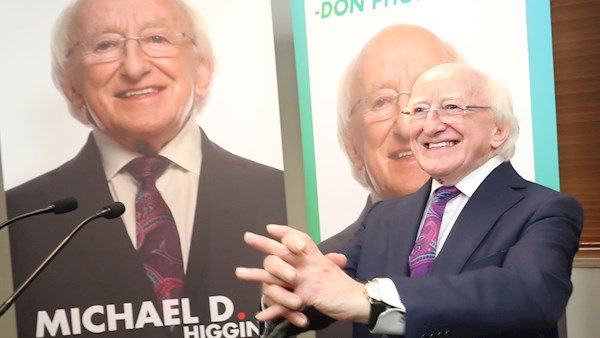
Of course, beneath this jamboree of consensus, there were other narratives emerging. One such story animating the pundits was the disappointing result for Sinn Féin’s Liadh Ní Riada, who ran on a socially progressive platform. That was one story. But it was not thestory. Exit polls released the night before predicted a much stronger than expected showing for candidate Peter Casey, who only a week before, could look forward to scraping a paltry 1% or 2%. Instead, he pulled in 23% of the total vote – coming in second. A distant second, behind Higgins’ 55%, but nonetheless Casey’s surge was remarkable. Headlines followed: ‘Higgins keeps crown but Casey rocks establishment’. To what or to whom did Casey owe this saving from the jaws of electoral annihilation? Casey, one of a trivium of candidates contesting this election who owed their public prominence to their stints on the Irish version of ‘Dragon’s Den’, saw his vote spike upwards on account of his bashing of welfare recipients, and even more particularly, the Irish Traveller population. For example, in a radio interview, Casey labelled the recent recognition of Travellers as an ethnic minority as bogus, castigating them as a people who live on others people’s land, and mumbled about the presence of Travellers vis-à-vis the adverse effect on property prices. This desperate dredging of the murkier undercurrents in order to capitalise upon and mobilise the last ‘acceptable’ forms of prejudice in Irish society did not constitute a bolt out of a clear blue sky. It did, however, signal something of shift in terms of the intensity and explicitness of such discourse.
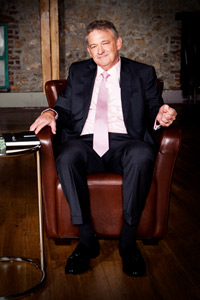
This repeated display of public minority bashing, with such tedious predictability that it ought to be elevated to the status of an iron law, conjured up the ‘he-is-just-telling-it-like-it-is-brigade’ (hereafter HIJTILIIB). This HIJTILIIB was formerly found living in near-confinement in the doldrums of twitter and the comment sections of shite news-sites, but is now increasingly gaining omnipresence. This brigade likes a man who cuts through all the noise, all that do-goody fluffy-fluff. Sticks it to ‘the establishment’. Likes to drain swamps. Also, loves being part of the swamp. Sticks it to the ‘snowflakes, who can’t take an aul’ bit of racism’. The HIJTILIIB, likes a man who, despite his flaws, stands up and presents us with a vision of the world and ourselves we already have, in ways that we don’t have to critically engage with it. ‘I like that fella, he talks like us, he also speaks without the cumbersome burden of reflexivity’. Radical stuff.
Michael D. Higgins’ victory speech, however, struck an altogether different tone than the tenor that had come to mark much of the debates during the latter end of the campaign trail. For some, Higgins’ election signalled a radical repudiation of political projects and discourse couched in logics of exclusion and marginalisation. Higgins’ espousals were markedly distinct from the politics practiced by many of his neo-liberal cheerleaders, such as those in the governing party Fine Gael. Higgins declared: ‘We are at a time of transformation and there is a momentum for empathy, compassion, inclusion, and solidarity which must be recognised and celebrated’. He continued with such ecumenical sentiments, peppering his speech with statements such as ‘a republic after all is a life lived together’.
Witnessing saccharine ‘centre’ liberals in the hours after Higgins’ election, with their near-dislocated shoulders from patting themselves on back (they don’t high five, that’s too communist) and creaking necks from nodding in conspicuous approval, it would be all too easy to dismiss such rhetoric as merely that, just rhetoric. This may be especially warranted in a context where a deepening housing crisis that has brought the greatest levels of homelessness the state has ever seen, in cities stalked by vulture funds, to take just one obvious caveat against any murmur of enthusiasm. But of course, there is no such thing as just rhetoric. This election has surely shown us that, at the very least. When we rhetorically construct ‘the Republic’ as a project in the making, one that is lived, yet is still to come, as a promise to widen and deepen the spheres of social inclusion, it is not nothing. It is, however high sounding or remote one may be tempted to deem it, a decidedly political act. As prefigurative gestures, such articulations hail and enact, however fleetingly, the modes of being and community they espouse. So, then, surely such a resounding victory of Michael D. Higgins, securing the largest ever personal mandate an Irish election has bestowed on an individual, translates into the exorcizing, or at least the thorough going defeat of what might be termed right-wing populism in the Irish political arena? And even more optimistically still, does it mean the temporary silencing of the HIJTILIIB? Well… not so fast. Firstly, the vote for Higgins does not altogether denote such a clear-cut rejection of the political vision (however confused a vision it might be) represented by Casey. The election certainly does not mean the relegation of prejudice against Travellers and welfare claimants to the margins of Irish life. Indeed, Casey does not represent an outlier in terms of the opinions his espoused, views which are well accommodated by the mainstream of public-political discourse.
A few days after the election, Casey, taking a page from the playbook of bumbling would-be despots, threw out a feeler. One that could be retracted if it didn’t gain traction. What does this oh-so-radical spectre that is haunting the establishment do? He declared that he might just stay in politics, floating the idea of running for Fianna Fáil. Fianna Fáil? That nursery of incompetence that rode the country into to the maelstrom of economic chaos? Only for us the emerge saddled with so much debt, I can hear my yet-to-be-born children crying in the next room. Fianna Fáil representatives, however, quickly dismissed such a move, saying they is currently no room at the inn.
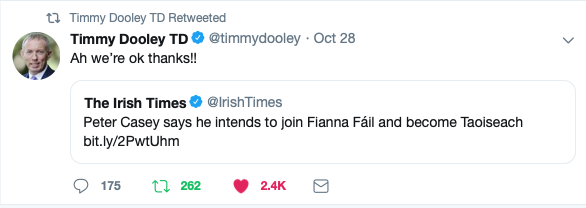
Well then, what next? Casey suggested he might have to set up ‘his own Fianna Fáil’. There was also talk of Casey joining Renua, a failed rump of a party that split from Fine Gael in an effort to become more establishment than the establishment itself. Water, it seems, still finds its own level. All of which tell us that despite the mock scramble to dissociate from Casey’s rhetoric, the Irish mainstream is well capable of accommodating the likes of Casey. Of course, Casey is really just some mirror image of the Irish establishment- after a night on the town. Or perhaps an accidental selfie of the establishment before it managed to strike its ‘good pose’. That Casey seeks a political home in the ‘centre’ ground of Irish politics in telling. The centre cannot hold, as W.B. Yeats moaned. These days, the self-appointed centre is strange and spectral thing indeed (perhaps it always was). Every time you go looking in earnest for this centre, you always find it a little more to right than you remember. So rather than Casey’s election result representing a pathological deviation from the established norms of Irish politics, it is an outgrowth of it. To take one illustrative example, established Irish broadcaster Pat Kenny, when moderating one of the presidential debates, put a question to the prospective candidates, apropos of the controversy generated by Casey, asking if they would be comfortable living near travellers. Posing the very same question with respect to any other minority group would be, we might still hope, strictly taboo. It is scarcely imaginable that the status of an ethnic minority should up for debate. But it is.
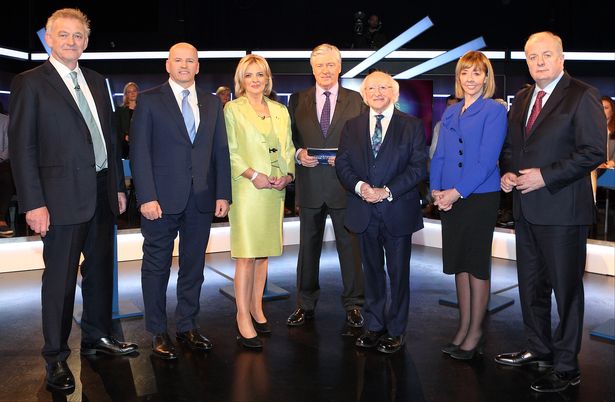
In the various media forums in the aftermath of the election some commentators deemed those brandishing the R-word or even the F-word and citing Casey’s campaign turn as evidence of a growing tolerance for fascist and racist inflected discourse in Irish politics, were accused of engaging in hyperbole. Hyperbolic on what count? Or was it a simple classificatory error? Such as, ‘such talk is not really very racist, bigoted, classist, etc.’ Which begs the question, what is it then? Or is it a matter of timeliness? When is it no longer ‘too soon’ to bring out the F-bomb? Of course, the problem with such hesitancies is that they risk only acknowledging forms of oppression and discrimination when they have reached their terminal expression. Yet, even the most brutal regimes of power are constituted by banal, quotidian, micro- transactions. That is, when it comes to racism, classism, etc., we should stop looking for monsters. A racist is not necessarily always someone who racks up unusually steep dry cleaning bills owing to a large collection of white sheets. It is the everyday practices of quietly delegitimising the position of a minority, or the continual inscription of relations of superiority, through which deep logics of exclusion and structural form of violence are reproduced. It is this perpetuation of an ontological violence, or foundational violence, which constructs the being of others as somehow inferior, dangerous, or otherwise unworthy of the full admittance into the sphere of recognition. This violence of language may not be a sufficient precursor towards more explicit forms of violence, but it is a necessary one. But sadly, this is not a matter of resisting logics of exclusion against Travellers gaining a foothold in Irish society. It is about contesting the modes of structural violence and marginalisation experienced by Travellers for generations.
For those who still insist that Casey’s et al rhetoric against Travellers and the poor is not racist or bigoted, fair enough. One does not need to be au fait with Lacanian psychoanalysis to see that that much of the discussion around Travellers and the poor is ordered according to the same logics that structure most racist discourses. That is, the Traveller and welfare claimant, constitute this suspect Other that stalks the very limits of society, yet remains outside its bounds. This Other excessively indulges in what we are denied. This Other has stolen what is rightly ours. Be it the lazy welfare recipient who refuses to work, yet somehow lives a life of unfettered enjoyment. Or is it the figure of Traveller who according to one newspaper report, people are tired of seeing sauntering around in brand new vans? What is this ‘thing’ that these people have stolen from us? And what would it mean to get it back? Given the deep poverty experienced by those on social welfare, and the extraordinarily high suicide rates and low life-expectancy amongst Travellers, one might conclude they have done a very poor job at stealing our ‘thing’.
Yes, people are indeed angry. The violent social feedback of neo-liberal economics has people looking for some easy target. The political imperative then, is not the negation of antagonism, but the redrawing of an antagonistic frontier where it belongs.
Gary Hussey is a PhD researcher in social theory at the National University of Ireland – Galway, where we works on the relation between violence and territory in the spatial context of Derry city. He tweets at: @GarHussey.





